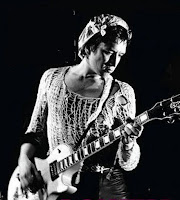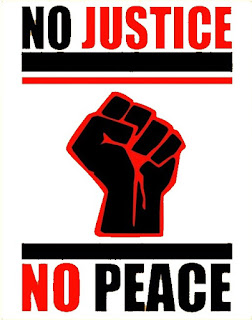I.
No justice, no peace is a political slogan one often hears chanted during protests; particularly protests involving the black community. Its precise meaning is said to be contested, which is rather surprising as I would've thought its message is perfectly clear: as long as there is social injustice, there will always be political discord and violence [1].
What's interesting is how it ties ideas of justice and peace - or injustice and violence - inextricably together. And that's what I wish to examine here ...
II.
According to Byung-Chul Han, the fact that working-class children have restricted educational and employment opportunities, is an injustice, but it isn't a form of violence: "If violence is used as shorthand for general social negativity, the contours of the idea become hazy." [2]
In other words, the conception of violence must be kept clear and distinct from other ideas and, indeed, not conflated or confused with the operation of power. For even structural forms of oppression in which power is embedded and codified within a system - be it a social, political, or legal system - "is not violence in the strict sense of the word" [3].
Rather, it is a rulership technique which allows those in control to "rule discreetly and much more efficiently than ruling by violence" [4].
III.
Byung-Chul Han is not the only theorist to hold such a view; the Italian philosopher Vittorio Bufacchi, whose work is primarily concerned with questions of social injustice and political violence, also suggests that there is a need to rethink the relationship between these things.
Whilst conceding that it is tempting to describe acts of injustice as acts of violence - if only to emphasise their brutality and immorality - he nevertheless argues that, ultimately, there is nothing to be gained by a polemical attempt to either replace one term for the other, or see them as synonymous: "Violence being a more extreme phenomenon than injustice [...]" [5]
The thing is, however, as a working-class child, I feel myself entitled to speak of violence. And whilst I might not jump in front of racehorses or wear a BLM t-shirt, I'm also sympathetic to women who experience systemic sexism, or persons of colour who experience institutional racism, as forms of violence.
For even if such violence is mostly symbolic and disguised or invisible, that doesn't make it any less real. And for academics to insist that despite the often intimate relationship between power and violence "there is a structural difference between them" [6], feels like an anaemic form of sophistry.
Notes
[1] Obviously, I am interpreting the slogan as a conditional statement, implying that civil peace is impossible without social justice and which not only sees violence as a consequence of injustice, but arguably warns of (or threatens) such. Others, by contrast, see it as a conjunctive statement to be interpreted as saying that neither peace or justice can exist without the other.
Interestingly, just as its meaning is somewhat ambiguous, so is the origin of the slogan somewhat obscure, some researchers tracing it all the way back to a note written by the African-American author and activist Frederick Douglass in 1859.
[2] Byung-Chul Han, Topology of Violence, trans. Amanda DeMarco, (Polity Press, 2018), p. 77.
[3] Ibid., p. 78.
[4] Ibid.
[5] Vittorio Bufacchi, Violence and Social Justice, (Palgrave Macmillan, 2007), p. 2.
Later, Bufacchi admits that whilst the terms violence and injustice are not interchangeable, nevertheless the relationship between them is convoluted and they interact on several different levels. Thus it would be wrong to think of political violence and social justice as a mutually exclusive dichotomy, even if the former has an instrumental value and the latter an intrinsic value (i.e., violence is a means to an end, unlike social justice which is an end in itself). See his Introduction to the above text.
[6] Byung-Chul Han, Topology of Violence, p. 79.


